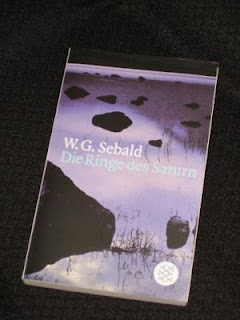*****
Die Ausgewanderten (The Emigrants) was one of Sebald's earlier works of fiction, a book where a familiar narrator tells us stories of people forced to leave their homelands at some point during the twentieth century. The four sections each focus on a different person, all of them someone from the narrator's life. There's a man the narrator rented a house from in East Anglia; his former primary school teacher; a great-uncle who emigrated to the US; and an artist he met during his time as a research student in Manchester. Over 350 pages, we learn that these men are linked by their experiences - and are representative of the fates of millions of people throughout Europe in the twentieth century...
Die Ausgewanderten is another Sebaldian trip through time, four excellent stories accompanied by the usual black-and-white photos. For the first-time reader, one of the main puzzles is working out whether the book is fact or fiction. These are stories, but you could be forgiven for thinking it's all out of the Sebald family archives - which is not to say that it's completely made up. The ideas are obviously close to the writer's heart.
The main theme of the book is the effect of war on Europe and, in particular, its Jewish population. Each of the four protagonists is affected in some way, with most being forced to leave their home, and their fate is representative of the wider suffering of their people, a suffering (as shown with the narrator's Great-Uncle Ambros) which leaves its mark:
"Nichtsdestoweniger erweckte er, selbst wenn er nur am Fenster stand und hinausblickte, stets den Eindruck, als sei er von einem heillosen Leid erfüllt."
p.162 (Fischer Verlag, 2013)
"Nevertheless, he constantly aroused, even when merely standing at the window and gazing out, the impression that he was suffused with incurable suffering." *** (my translation)These examples of the Jewish diaspora show the reader that the pain caused by displacement never really goes away.
The suffering takes its toll, and the four men are gradually worn down by a life that shouldn't have been theirs. As each story nears its end we learn of the inevitable consequences of their hurt, whether it be self-harm, deliberate isolation or suicide, with each of the men turning away from the world. On the whole they prefer nature to the company of other people, hiding as far away as possible, in hunting lodges, abandoned buildings or the mountains.
The narrator is a curious researcher, drawn to find out more about the figures from the past, each fact leading him on, drawing him further into the story. This communicates itself to the reader in the way the stories lead on to other stories, giving us third- or even fourth-hand information (and the rather blurred lines between fact and fiction). Whether we ever really get to the heart of the matter is another question entirely...
While the Jewish question is the obvious starting point of the book, another major theme
is homosexuality, overt in at least one story, latent in all the others. All of the main characters are men who seem uncomfortable in the presence of women (even the man who's married to one), and there's a hint of a suggestion that a rejection of a so-called 'normal' sexual orientation is another way of turning against the world. This is a topic which has been handled at length by the academic and writer Helen Finch, in her book Sebald's Bachelors: Queer Resistance and the Unconforming Life, and while I've only read summaries of her work, having finished Die Ausgewanderten, I can definitely see where she's coming from.
While there are four stories, they're of differing lengths with the final two being much longer than the first sections. I enjoyed them all, but I found the third part, about the great-uncle, to be the weakest of the four; it was far too long for what it was and was overburdened by too many diary extracts. However, once Sebald gets back to the narrator's voice, the language, as always, is stunning. It's the usual tale of meticulously constructed sentences with a sprinkling of slightly formal, old-fashioned language (e.g. obzwar, demungeachtet, wenn ich ihrer ansichtig wurde). This old-fashioned tone works well here, adding to the effect of a man unearthing history.
A tale of four men, then? Well, no - I'd say five. You see, the fifth of the 'emigrants' is the narrator himself (i.e. Sebald...), and this becomes obvious when he makes a trip to Germany towards the end of the book in an attempt to find his lost home. It's an endeavour that was never likely to succeed:
"Obgleich ich während meines mehrtägigen Aufenthalts in Kissingen und in dem von seinem einstmaligen Charakter nicht das geringste mehr verratenden Steinach zur Genüge beschäftigt gewesen bin mit meinen Nachforschungen und meiner wie immer nur mühevoll vorangehenden Schreibarbeit, spürte ich doch in zunehmendem Maß, daß die rings mich umgebende Geistesverarmung und Erinnerungslosigkeit der Deutschen, das Geschick, mit dem man alles bereinigt hatte, mir Kopf und Nerven anzugreifen begann." (pp.332/3)
"Although, during my stay of several days in Kissingen and in Steinach, which revealed not the slightest hint of its former character, I was satisfactorily engaged with my research and my writing, which, as always, was progressing only with great difficulty, I increasingly felt that the surrounding intellectual poverty and inability to remember of the German people, the skill with which everything had been whitewashed, was beginning to play on my nerves." ***Sometimes, it's just not possible to go home...
*****
An English version (The Emigrants) is available from Vintage Books in Michael Hulse's translation (and having laboured for an age to produce the tiny (inadequate) quotation just above, I take my hat off to him...).




